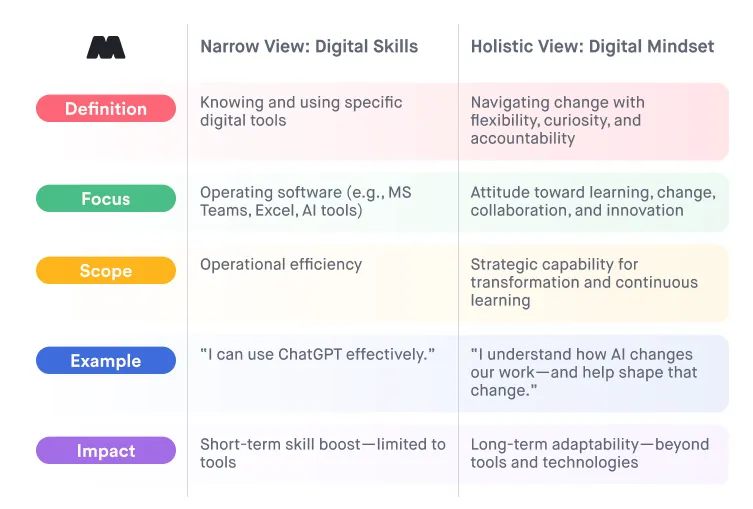
For more than 20 years, companies have been driving digital transformation—yet many still stumble over cultural change. The rise of Artificial Intelligence makes it clearer than ever: digital transformation isn’t just a tech project. It’s a strategic challenge for the whole organization—and it starts with the right mindset.
- A digital mindset combines curiosity about new technologies, agility, problem-solving skills, data literacy, and a sense of ownership—blending technological, strategic, and cultural dimensions.
- Many organizations roll out tools but fail to anchor them strategically. According to the Masterplan Report 2025, the average digital maturity score is only 3.3 out of 5, and just 25.6% feel well-prepared for AI. The biggest gaps: leadership, learning culture, and mindset.
- Technical know-how is not enough—organizations also need Power Skills such as critical thinking, emotional intelligence, and collaboration.
- The most successful companies systematically cultivate a digital mindset—through leadership, learning culture, strategic tech integration, and strong role models.
{{blog-digital-mindset-definition-en="/custom-rich-text"}}
Digitalization Is a Question of Organizational Maturity
Tools, platforms, automation—digital technologies are everywhere in business. But in many cases, their potential is left untapped. Technological progress is visible—new software, pilot projects—but often not embedded into strategy. Instead of transformation, you get fragmented efforts.
This gap is especially visible with AI. Companies are piloting new AI applications but struggle to integrate them into workflows, processes, and strategy. The problem isn’t a shortage of AI tools—it’s the lack of organizational maturity to use them effectively.
From the Masterplan Report 2025 (German):
- Average digital maturity: 3.3 out of 5
- Only 25.6% feel well-prepared for AI
- The biggest deficits: leadership, learning culture, mindset
Knowing the Tools Won’t Get You Through the Change
Technical skills are important—but reducing digital transformation to software training is shortsighted.
Much of what people learn today will be outdated tomorrow. Without understanding context and change dynamics, learning remains reactive—not transformative. This often stems from a too-narrow view of “digital skills.”
What’s missing is a foundation of adaptable, future-proof capabilities—like those described in Masterplan’s Power Skills: collaborative work, digital communication, problem-solving.
What “Digital Mindset” Really Means
The term has many definitions—and rightly so. There’s no one-size-fits-all model, but several valuable frameworks highlight common principles:
- Slack talks about a “Digital-First Mindset” based on strategy, collaboration, metrics, processes, and user experience.
- KPMG emphasizes a growth mindset, innovation at every level, and courage to act.
- Forbes (IESE Business School) points to empowerment, agility, and disruption as key drivers.
While the details differ, they all agree:
A digital mindset unites strategic thinking, experimentation, data-driven decisions, collaborative culture, and openness to change.
Core Traits of a Digital Mindset
- Openness to change: Actively shaping transformation, not resisting it.
- Lifelong learning: Building, sharing, and reflecting on knowledge continuously.
- Learning from mistakes: Seeing criticism and setbacks as opportunities, not career killers.
- Ownership: Proactively steering one’s own development.
- Collaboration: Practicing openness, transparency, and cross-functional teamwork.
- Data & process literacy: Basing decisions on evidence—not just hierarchy or intuition.
- Adaptability: Staying flexible in a fast-changing business landscape.
- Innovative thinking: Developing new ideas and turning them into tech-driven solutions.
These traits aren’t just valuable for individuals—they shape team and organizational culture. Companies with a strong digital mindset move faster, think more agilely, and stay innovative—even under changing conditions.

AI Shows: Without Maturity, There’s No Impact
Since ChatGPT’s debut, AI is on everyone’s radar. But many companies aren’t ready to use it meaningfully. Often, AI is disconnected from other digital initiatives—or departments lack the necessary AI literacy.
From the Masterplan Report 2025 (German):
- 85% of low-maturity companies also rate their AI skills as poor
- Only 31.1% approach digitalization and AI as a joint strategy
- Nearly 46% acknowledge digital maturity as a prerequisite—yet still use AI in isolation
AI isn’t an add-on. It only delivers value when processes, data, people, and culture work together—and that requires a strong digital mindset.
5 Steps to Cultivate a Digital Mindset
1. Empower leaders as role models
Leaders must walk the talk—showing openness, communication, experimentation, and reflection. Experienced colleagues can act as mentors and coaches to develop the mindset across teams.
2. Build digital competencies strategically
Digital literacy belongs in every department—not just IT. Everyone should share a baseline understanding of tech, communication, and ethical considerations.
3. Institutionalize learning culture
Learning shouldn’t be left to chance. Create formats, routines, and systems that encourage self-directed growth and make continuous learning part of the everyday workflow.
4. Think of AI and digitalization as one
AI tools need data, processes, and strategy. Integrate AI as the next step in your broader digital journey—not as a standalone initiative.
5. Treat change as ongoing
Transformation isn’t a project with an end date—it’s a permanent state. That means clear structures, iterative processes, and psychological safety, where mistakes are allowed and seen as drivers of innovation.
Conclusion: Digitalization Starts in the Mind
Automation, AI, digital tools—they’re all reshaping the workplace. But their impact depends less on what tools a company implements and more on how ready and open it is to change.
Technology alone changes nothing. Real progress happens when people are equipped to understand it, put it into context, and actively shape its use.
Focusing on isolated tool skills keeps you in reactive mode. Building a digital mindset, learning culture, and leadership strength makes you adaptive—and future-ready.
Developing a digital mindset isn’t optional. It’s the foundation for everything that comes next.
How Masterplan Helps You Get There
With Masterplan, you’ll develop the skills that truly drive digital transformation:
- Courses on digitalization, AI, communication, and leadership
- Practical knowledge in change management, mindset, and future skills
- Personalized growth maps and AI-powered learning paths
- A learning platform that integrates seamlessly into any department’s strategy
Our goal: Turn tool training into real transformation. Turn upskilling into lasting change.
